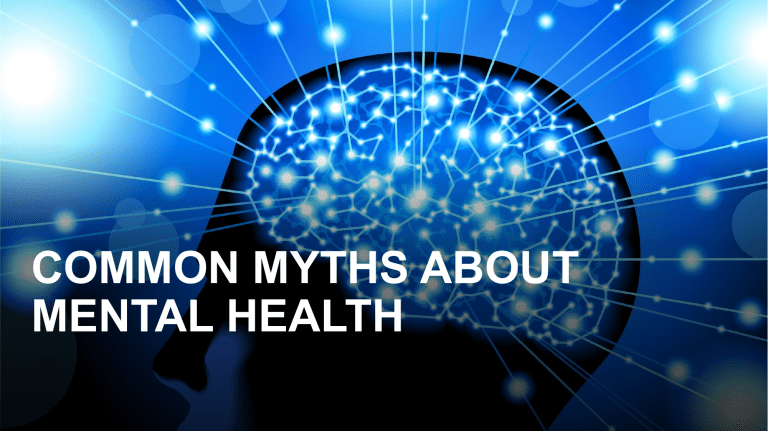
COMMON MYTHS ABOUT MENTAL HEALTH Brief Introduction Myths vs Facts AGENDA How to Help Yourself & Others Conclusion INTRODUCTION WHAT IS MENTAL HEALTH & WHY IS IT IMPORTANT? • Our emotional, psychological, and social well-being • Affects how we think, feel, and act • Determines how we handle stress, relate to others, and make choices • Mental health problems effect your thinking, mood, and behaviour FACTORS CONTRIBUTING TO MENTAL HEALTH PROBLEMS • Biological factors, such as genes or brain chemistry • Life experiences, such as trauma or abuse • Family history of mental health problems MYTHS VS FACTS MYTH #1: Mental health problems are uncommon MYTH #2: Mental illnesses aren’t real illnesses MYTH #3: Mental health problems are a sign of weakness MYTH #4: All people with a mental illness are violent / dangerous MYTH #5: Mental illnesses are just an excuse for bad behaviour MYTH #6: Kids can’t have a mental illness, like depression MYTH #7: Mental health problems are permanent HOW TO HELP YOURSELF & OTHERS How to Look After Your Mental Health 1. Talk about your feelings 2. Keep active 3. Eat well 4. Keep in touch 5. Ask for help 6. Take a break 7. Do something you’re good at 8. Accept who you are 9. Care for others How to Support Someone With a Mental Health Problem 1. Set time aside with no distractions 2. Let them share as much or as little as they want to 3. Don’t try to diagnose or second guess their feelings 4. Keep questions open ended 5. Talk about wellbeing 6. Listen carefully to what they tell you 7. Offer them help in seeking professional support and provide information on ways to do this 8. Know your limits CONCLUSION








